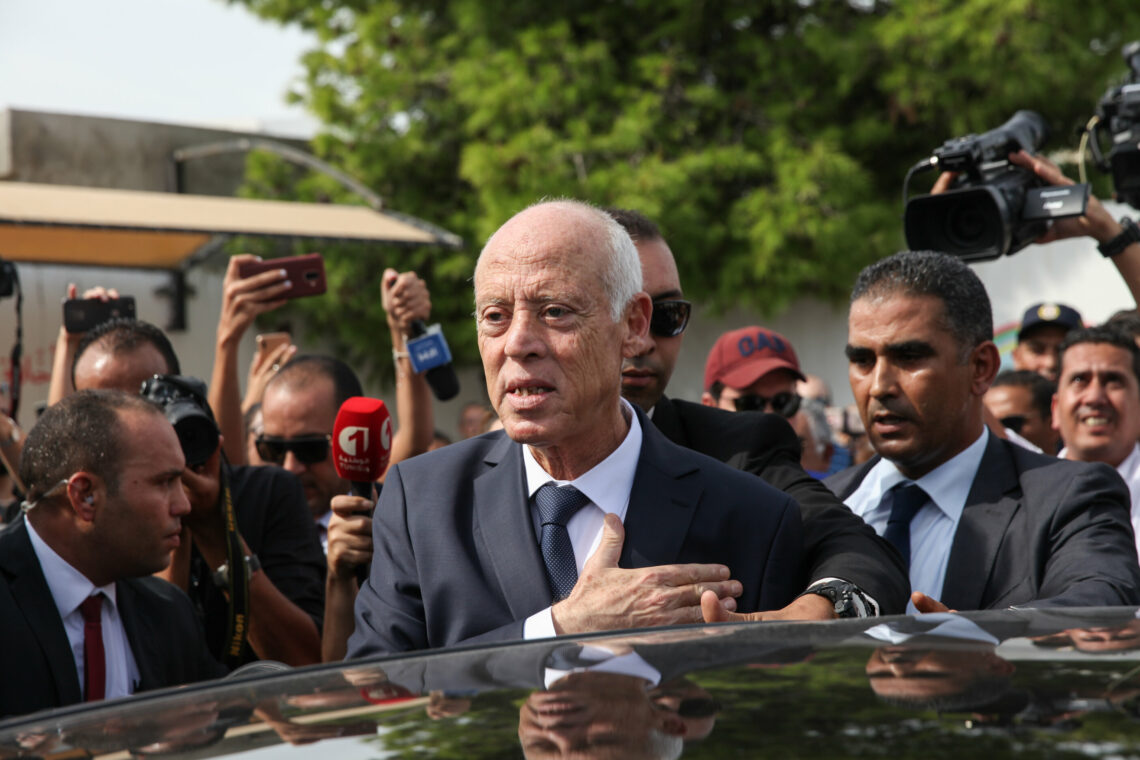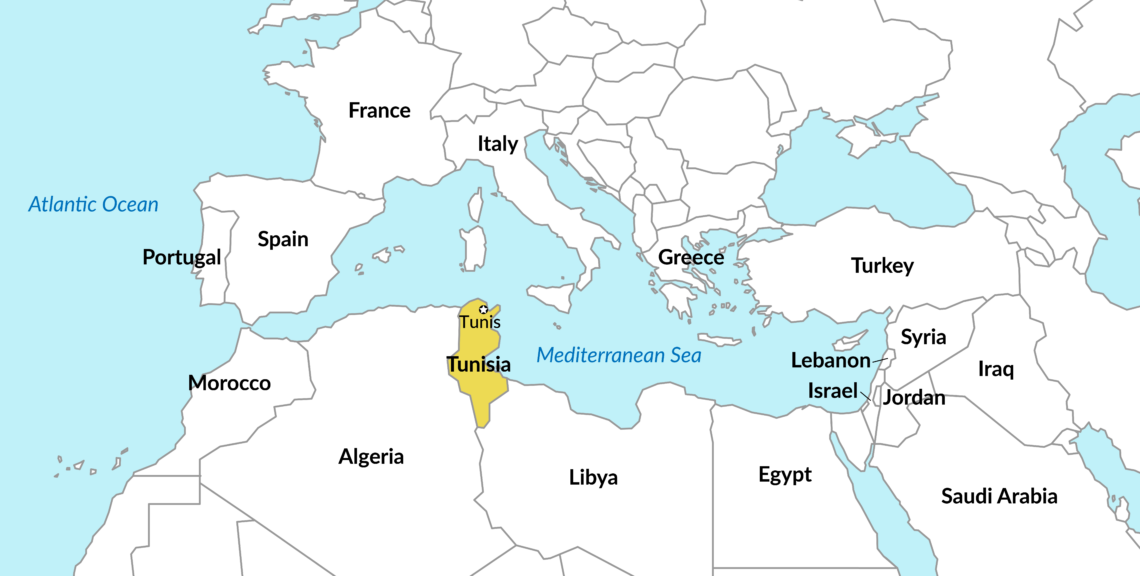National crisis, Mediterranean issue
After a wave of protests in July, Tunisian President Kais Saied responded to the crisis by suspending parliament and dismissing the prime minister. The move could spell disaster for democracy in Tunisia, which would send shock waves across the region.

In a nutshell
- The Tunisian president has suspended the parliament
- The opposition fears the move will lead to a dictatorship
- The army could play a decisive role in the crisis
Over the summer, Tunisia saw a wave of nationwide protests over corruption, poverty and the government’s handling of the pandemic. On July 25, President Kais Saied announced that parliament would be suspended for one month, a measure he then indefinitely extended in late August. He also dismissed Prime Minister Hichem Mechichi. The former interior minister and advisor to the president had been nominated to the position by President Saied exactly one year earlier, on July 25, 2020.
President Saied argued that his actions were justified by Article 80 of the Tunisian Constitution, which stipulates that the head of state is entitled to exceptional measures during a state of “imminent danger.” Normally, a constitutional court would decide whether the article applies in the current circumstances. However, Tunisia has yet to form such a court.
The Tunisian Army later garrisoned the parliament with armored vehicles, preventing Rached Ghannouchi, Speaker of the Assembly and leader of the moderate Islamist party Ennahda, as well as other deputies from entering. Mr. Ghannouchi and his party had criticized the measures taken by the president, voicing concerns over a potential new dictatorship.
At the moment, Mr. Saied appears to have the support of the citizens.
The local office of the Al Jazeera news channel was shut down by the police. Many Tunisians responded with enthusiasm, flooding the streets of the capital and calling for the dismantling of the Ennahda Movement. The party has dominated the political scene since the 2011 Arab Spring, and many Tunisians have come to see it as corrupt and unpatriotic.
Roots of the crisis
Since the overthrow of former President Zine El Abidine Ben Ali in 2011, Tunisia has gone through many crises, some profound. But so far, all of them have proved temporary. Reforms, especially in the security sector, effectively prevented disasters, as demonstrated by the June 2019 terrorist attacks in Tunis. The 2019 parliamentary and presidential elections were taken as signs that the country had completed its transition and successfully embraced democracy.
Kais Saied, a law professor with no political experience, won the presidential ballot held after the death of President Beji Caid Essebsi. With Ennahda’s support, Saied received 18 percent of the vote in the first round and 72 percent in the second. His victory was heralded as the end of an old and corrupt system.
However, no party was able to form a government. On February 27, 2020, under Prime Minister Elyes Fakhfakh, a national unity government was established. Half of the cabinet members were independent ministers.
Facts & figures

Soon the country faced not only internal political divisions but also an economic crisis. When the Covid-19 pandemic hit, it crippled the mainstay of the Tunisian economy – tourism, which accounts for 8 percent of the country’s gross domestic product. The crisis also put a severe strain on the health system. As of July 2021, there were some 150 deaths per day caused by the coronavirus, with hospitals on the verge of collapse and a serious lack of oxygen and medicines.
After six months of turmoil, a new technocratic government was established in August 2020 by Mr. Mechichi. Nonetheless, deep divisions remained, allowing President Saied to take on a more authoritarian role. In April 2021, he attempted to assume full control of the security services, with limited success.
At the moment, Mr. Saied appears to have the support of the citizens, with approval ratings around 39.2 percent. But the tense political situation means the conflict between the two main political camps could soon escalate.
Historically, the Tunisian Army has never been overly politicized. During the 2011 uprising, it refused to intervene on behalf of President Ben Ali, paving the way for political change and gaining citizens’ trust. Because of this, the armed forces will likely play a determining role in how future events will unfold. They currently appear to be following President Saied’s orders.
International community
Over the next few weeks, the international community will have to assess the influence of foreign actors in the situation. Turkey has been involved in Tunisian politics for some time through the Muslim Brotherhood, which has ties to Ennhada. In parallel, French influence in the Maghreb, and the resulting friction with Ankara, should not be underestimated. President Saied’s resolute stance could be bolstered by French support behind the scenes, in addition to the obvious backing of the United Arab Emirates.
A collapse of Tunisian democracy would inevitably influence the internal dynamics of neighboring countries, primarily Libya, but also Algeria, Morocco and Egypt – and even Italy, which has close economic and historical ties to Tunisia. Furthermore, two other related issues could spill over into Italian politics: migration and terrorism.
A collapse of Tunisian democracy would influence the internal dynamics of neighboring countries.
Exactly one week after the parliament was suspended, the Tunisian coast guard stopped a total of 309 migrants to Italy. Among them, there were 99 Africans of several nationalities, including five wanted for low-level crime. On August 8, the Tunisian Navy rescued 238 people aboard three boats in distress off the coast of the country.
Libyan connection
The broader North African context must be considered to understand the Tunisian crisis. Governments established in Tunis after 2011, and especially after 2019, have taken a neutral stance on almost all regional issues, preferring to focus on domestic challenges. During the 2013 coup in Egypt, which pitted the military against the people, the Tunisian political class took no sides. Tunis even remained impartial during the demonstrations in Algeria and throughout the whole Libyan crisis, despite common borders and strong sociohistorical ties.
In contrast, Libya has been vocal concerning the recent events in Tunisia. To many Libyans skeptical of a strong presidential system, President Kais Saied’s power grab has stoked fears that an elected president could soon turn into a dictator, even in the presence of a strong parliament.
Libya’s Khalid al-Mishri, the head of the advisory High State Council and a Muslim Brotherhood sympathizer, immediately proclaimed that any kind of political coup was unacceptable. Meanwhile, Field Marshal Khalifa Haftar welcomed the “intifada against the Muslim Brotherhood.”
President Saied’s actions have created deep resentment that will not easily fade.
But, unlike Libya, which is now in the “silent” phase of its third civil war in 10 years, Tunisia has functional institutions that prevented the collapse of the state. There is still no Libyan constitution. Although elections are scheduled for December of this year, no one knows if they will be only parliamentary or also presidential. Evoking the events in Tunis, some Libyans are calling for electing a new parliament in December but postponing the presidential ballot until a clearer solution to the constitution quandary is found.
Scenarios
What is next? There is no obvious way out. Close relations with the U.S. are long-standing, and Israel’s very existence may depend on them. These relations cover almost every possible field, and Israel will do its utmost to preserve them. But the path will not be easy at a time when Washington sees in China the ultimate enemy, and does not want a faithful ally to which it entrusts its technologies – some of which are classified – to endanger American security through its contacts with Beijing. That position was made clear to new Israeli Prime Minister Naftali Bennett during his otherwise successful August 27 meeting with President Biden.
Mr. Bennet will be hard put to find a solution, hampered by the very narrow majority held by his government. On the other hand, China – which needs quiet and stability for its economic investments – understands that it bears its share of responsibility in the problem; it is also aware of the fact that Tehran directly threatens Israel. Beijing itself has no interest in a nuclear Iran throwing the region into disarray and playing havoc with its ambitious “New Silk Road” project.
It will be up to Israel to move cautiously, going ahead with projects already underway but carefully weighing new initiatives. It may seek to reduce its technological cooperation with China, while hoping for that country’s understanding. As things stand today, a fruitful dialogue between the Jewish state, Washington and Beijing will not happen anytime soon.





